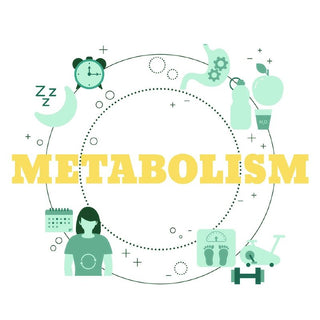Μεταβολισμός, Μεταβολίτες και Λεπτίνη: Πώς Επηρεάζουν το Βάρος και την Ενέργεια
Ο μεταβολισμός, οι μεταβολίτες και η λεπτίνη είναι τρεις βασικοί παράγοντες που παίζουν σημαντικό ρόλο στη διαχείριση του σωματικού βάρους και της ενέργειας του σώματος. Αν κατανοήσεις πώς λειτουργούν, μπορείς να βελτιώσεις την υγεία σου και να διαχειριστείς καλύτερα το βάρος σου. Ας δούμε πώς συνδέονται μεταξύ τους και πώς μπορείς να τα αξιοποιήσεις για την υγεία σου.
Τι Είναι ο Μεταβολισμός;
Ο μεταβολισμός είναι το σύνολο των διεργασιών που κάνει το σώμα σου για να μετατρέπει τις τροφές σε ενέργεια. Χωρίζεται σε δύο κύριες φάσεις:
- Αναβολισμός: Είναι η φάση στην οποία το σώμα αποθηκεύει ενέργεια και δημιουργεί νέα κύτταρα και ιστούς.
- Καταβολισμός: Στη φάση αυτή, το σώμα διασπά τα θρεπτικά συστατικά για να παράγει ενέργεια που χρειάζεται για τις καθημερινές λειτουργίες.
Ένας υγιής μεταβολισμός διασφαλίζει ότι το σώμα σου χρησιμοποιεί σωστά την ενέργεια που λαμβάνει και διατηρεί το βάρος σε φυσιολογικά επίπεδα.
Τι Είναι οι Μεταβολίτες;
Οι μεταβολίτες είναι μικρά μόρια που παράγονται κατά τη διάρκεια του μεταβολισμού. Αυτά χωρίζονται σε δύο κατηγορίες:
- Πρωτογενείς μεταβολίτες: Είναι ουσίες που είναι απαραίτητες για τη λειτουργία του οργανισμού, όπως τα αμινοξέα, οι πρωτεΐνες και οι υδατάνθρακες.
- Δευτερογενείς μεταβολίτες: Βοηθούν το σώμα να αλληλεπιδράσει με το περιβάλλον, όπως για την προστασία από μικρόβια ή τη ρύθμιση της ανοσολογικής απόκρισης.
Η διατροφή και οι καθημερινές σου συνήθειες επηρεάζουν τη σύνθεση και τη λειτουργία αυτών των μεταβολιτών, γεγονός που επηρεάζει τον μεταβολισμό και την παραγωγή ενέργειας.
Τι Είναι η Λεπτίνη και Πώς Μπορεί να Σε Βοηθήσει;
Η λεπτίνη είναι μια ορμόνη που παράγεται από τα λιποκύτταρα του σώματός σου και έχει άμεση σχέση με τον έλεγχο της όρεξης και τη διαχείριση του βάρους. Η λεπτίνη στέλνει σήματα στον εγκέφαλο για να ρυθμίσει το πόσο πεινάς και πόση ενέργεια καταναλώνεις. Όταν τα επίπεδα λίπους είναι υψηλά, η λεπτίνη αυξάνεται και βοηθά στη μείωση της όρεξης. Αντίθετα, όταν τα επίπεδα λίπους είναι χαμηλά, τα επίπεδα λεπτίνης μειώνονται, αυξάνοντας την όρεξη.
Η Σημασία της Λεπτίνης στην Απώλεια Βάρους
Η κατανόηση της λεπτίνης είναι ζωτικής σημασίας για τη διαχείριση του βάρους. Σε φυσιολογικές συνθήκες, η λεπτίνη βοηθά στη διατήρηση της ενεργειακής ισορροπίας. Όμως, σε περιπτώσεις παχυσαρκίας, μπορεί να αναπτυχθεί αντίσταση στη λεπτίνη. Αυτό σημαίνει ότι, παρόλο που τα επίπεδα της ορμόνης είναι υψηλά, ο εγκέφαλος δεν λαμβάνει σωστά τα σήματα για τη μείωση της όρεξης. Το αποτέλεσμα; Συνεχίζεις να τρως περισσότερο, ακόμα κι όταν το σώμα έχει ήδη αρκετό λίπος.
Αν αναγνωρίσεις και αντιμετωπίσεις την αντίσταση στη λεπτίνη μέσω μιας σωστής διατροφής, τακτικής άσκησης και περιορισμού των επεξεργασμένων τροφών, μπορείς να βελτιώσεις την απόκριση του σώματός σου στη λεπτίνη. Αυτό θα σε βοηθήσει να μειώσεις την όρεξή σου και να διαχειριστείς καλύτερα το βάρος σου.
Πρακτικά Βήματα για Βελτίωση της Απόκρισης στη Λεπτίνη
Για να αξιοποιήσεις τα οφέλη της λεπτίνης και να βελτιώσεις την υγεία σου, ακολούθησε αυτά τα πρακτικά βήματα:
- Υιοθέτησε μια ισορροπημένη διατροφή: Προτίμησε τροφές πλούσιες σε θρεπτικά συστατικά και μείωσε την κατανάλωση επεξεργασμένων τροφίμων και ζάχαρης, που συνδέονται με την αντίσταση στη λεπτίνη.
- Άσκηση σε τακτική βάση: Η σωματική άσκηση βελτιώνει την ευαισθησία του οργανισμού στη λεπτίνη, ενισχύοντας την καύση λίπους.
- Επαρκής ύπνος: Η έλλειψη ύπνου μπορεί να επηρεάσει αρνητικά την ορμονική ισορροπία, συμπεριλαμβανομένης της λεπτίνης, αυξάνοντας την πείνα.
Συμπέρασμα
Η κατανόηση του ρόλου της λεπτίνης και η διαχείριση του μεταβολισμού σου είναι το κλειδί για την υγεία και την αποτελεσματική απώλεια βάρους. Η λεπτίνη ρυθμίζει την όρεξή σου και την ενεργειακή κατανάλωση, ενώ η αντίσταση στη λεπτίνη μπορεί να κάνει δύσκολη την προσπάθεια απώλειας βάρους. Με σωστή διατροφή, άσκηση και καλό ύπνο, μπορείς να βελτιώσεις την απόκριση του σώματος στη λεπτίνη και να πετύχεις τους στόχους σου για τη βελτίωση της υγείας και της φυσικής σου κατάστασης.










